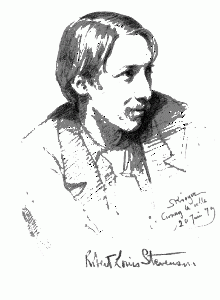Podcast: Play in new window | Download

We attend to Charm, elaborating on a short essay on charm by Richard Dury. Charm, from words, to amulets, to personal characteristics, to performance. You are invited to attend. [As heard on Cambridge 105 Radio]
Robert Louis Stevenson as a Countercultural Figure of the 1870s
Talk Presented to the Cambridge University Countercultural Studies Group
7 May 2010
RL Abrahamson
In 1882, Stevenson published a collection of his essays on a variety of writers: Villon, Victor Hugo, Walt Whitman, Henry David Thoreau, Robert Burns, John Knox, and others. He called the volume Familiar Studies of Men and Books. This talk will take on the form of a familiar study but of just one man, though many books. Like Stevenson, I will speak both about the man and his writings, and, as Stevenson carefully explained in the Preface to Familiar Studies, this will be only an impression, the development of one “point of view”. Thus the presentation will always be flawed; by its very nature it can never hope for any kind of completeness or accuracy: “the proportions of the sitter must be sacrificed to the proportions of the portrait,” as Stevenson says, “[…] and we have at best something of a caricature, at worst a calumny” (27.xiii). But then Stevenson embraced failure as an inevitable quality of human life. The fear of failure certainly was no reason to hold back. “Acts may be forgiven; not even God can forgive the hanger-back.”
So the point of view I am going to take in this discussion of Robert Louis Stevenson is his role as a countercultural figure of the 1870s, the decade of his twenties. We’ll probably need a working definition of countercultural, a term we have always kept pretty broad in this group. The countercultural figure, let’s say, is a person who disregards the conventions, and questions assumptions of the culture he or she resides in, but more than that, takes an active role in opposing these conventions and assumptions. This opposition can take many forms – individual or group action, political or literary, sustained or intermittent. Let’s see how Stevenson managed it. Read the rest of this entry »
E-Book PDF: Open in New Window | Download
Our journey begins with the Fool, a trickster, the one who disrupts our complacency and calls us out of ourselves to a world of joy and liberation. Court jesters always had special dispensation to say whatever they wanted, even if it was irreverent and disrespectful. In fact the Fool was expected to be irreverent and disrespectful. That was his role.
The Fool is also a pain to have around, never letting us rest, always trying to stir us up. Yet the Fool always knows when to stop; he is benign and if he harms us, it is only for our own good. He annoys but never destroys us.



